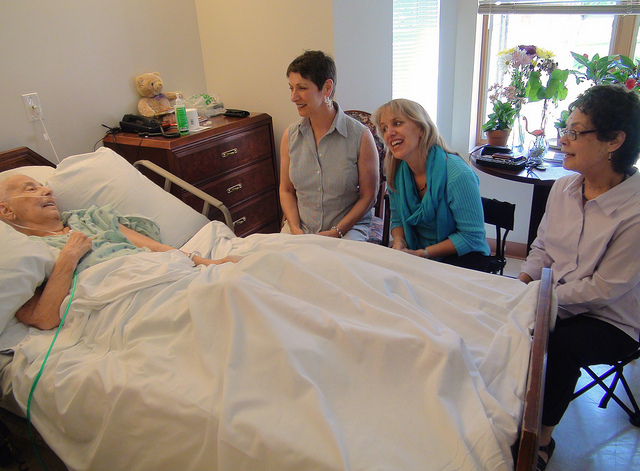Unique choir ministers to patients at the threshold between life and death
By Richard Steele, Lynette Kalsnes

Unique choir ministers to patients at the threshold between life and death
By Richard Steele, Lynette Kalsnes
A special kind of choir that sings to hospice patients is gaining strength across the U.S. They’re all-female groups called threshold choirs because they perform for people on the threshold between life and death.
The singers say the music doesn’t just help the patients – it helps the patients’ families, and even the choir members themselves.
Over at Chicago’s Resurrection Life Center nursing home, four women pull up chairs and sit in a half-circle near a woman lying in bed. They lean in close to the patient, Imelda Mizones, and start singing, “You are my Sunshine.”
The women are part of the Rainbow Hospice Threshold Singers. The choir’s one of about 100 non-denominational choirs across the country that sings a cappella to hospice patients.
Within a few lines of the song, Imelda Mizones chimes right in. Imelda’s 85, with terminal ovarian cancer.

“I think that’s exactly why you so feel so good because you remember something that was nice. A new boyfriend for instance,” Imelda says. There’s a song she connects with a new boyfriend.
“Let it snow, let it snow, let it snow,” she sings out, then adds, “And he was so good-looking.” The women all share a laugh.
The music doesn’t just bring back memories. It can lift the spirit and even decrease the pain. Rainbow Hospice music therapist Laura Pawuk, who helps oversee the choir, says research shows music can increase the flow of natural painkillers and decrease stress hormones.
“We’re always managing pain, always looking at pain at every single visit,” Pawuk says. “Pretty much every time I visit a patient who has pain, anxiety, agitation, there’s a significant decrease by the end of the session.”
One of the patient’s family members observed this change. Gayle Mrock, who was visiting her mother Wanda Parat, says she saw her mom’s breathing visibly ease while the choir was singing.
“My mom gets very uptight because she has a breathing problem, and when she gets uptight, certainly the breathing gets worse,” Mrock says. “When they came and sang for her, I mean you could see she just relaxed. And the same with me it made me feel good to see she was relaxed.”

Even with this joyful reception, choir members like Sigrid Brooks acknowledge that singing to the sick and dying can be difficult. But she says it has a healing effect on the performers too.
“It’s not for everybody,” Brooks says. “But some people are drawn to this. And sometimes it has a toll, but it’s really a gift, and we’re getting back more than we’re giving.”
That gift becomes evident as the choir continues singing to Imelda Mizones. Even though she’s in bed and has experienced some hair loss, Imelda’s so lively her energy is tangible.
“I’m sort of new. I’m only in hospice two months now, I still got a lot of time to go,” Imelda says.
“Yes, she does,” chimes in her friend Sandy Dudek, who’s visiting with Imelda’s grandson. “She’s got a lot more stories and many songs to go.”
Each time the choir finishes a song, Imelda keeps asking for more: “More, more, more,” she says.
After performing several tunes, the choir sings one last number. It’s a song they personalize for every patient they sing to:
“Imelda, you are beautiful, Imelda, you are strong,” they sing.
“Oh boy,” Imelda says.
She ends her session by thanking the choir.
“It was just such a happy, happy time. I’ve never had a concert given for me before, truly,” she says.
“Many more to come,” a choir member assures her.
“Oh, I hope, I hope,” Imelda says, then jokes, “Anytime. I’m here.”

In that room, Shirley Carlin is playing pinochle with her two sisters. One of them lives in a room right next door.
The choir hopes to ease Shirley’s time in hospice, and to ease her passage on.
The choir serenades Shirley and her sisters, singing, “In these times, in these uncertain times, I will remain open to the miracle that is each moment.”
After the intimate concert, the choir leaves Shirley’s room, and the sisters go back to their card game.
Shirley’s asked how the music made her feel.
“Makes me feel good, makes me feel good,” she says. Two days later, Shirley dies peacefully in her sleep.
NOTE: Adam Peindl produced this story.


